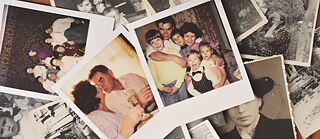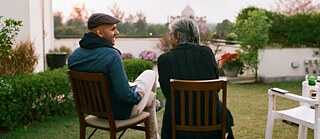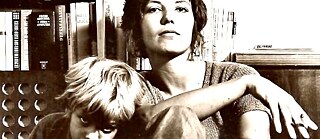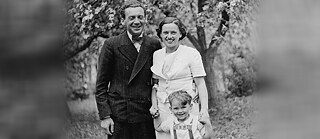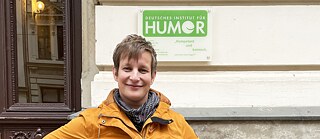Fragmente des Alltags
The Diary
Mithilfe von Tagebucheinträgen transportieren uns Dina Elsayed und Monika Müller‑Kroll an verschiedene Orte und Zeiten in den USA und in Deutschland. Es entsteht ein Mosaik des Alltags, das sich aus Widersprüchen und Parallelen sowie Banalitäten und Ernsthaftigkeit zusammensetzt.
Diese Folge anhören: Apple Music | Spotify | Download
Diese Folge stammt von Dina Elsayed und Monika Müller‑Kroll. Dina hat für das National Public Radio (NPR) und die „Financial Times“ gearbeitet. Seit 2017 lebt sie als freie Journalistin in Berlin, wo sie gemeinsam mit Monika für den englischsprachigen Sender KCRW Berlin tätig war. Monika hat bereits in Städten überall auf der Welt gelebt, wie etwa Amsterdam und Los Angeles, und dort Beiträge für verschiedene deutsche Radiosender produziert. Außerdem sie hat für NPR gearbeitet und ist aktuell als Editorin und Radioproduzentin in Berlin tätig. In dieser Episode hören wir Tagebucheinträge, die von verschiedenen Orten auf der Welt stammen. Gelesen werden sie von ihren Autor*innen. Die Musik der „Diary“-Folge kommt von Samuel Shelton Robinson und Jonathan Kroll. Außer dieser Folge hat Monika bereits die Episoden „Little America Revisited“, „I Love You, I Hate You“, „Legacies of the Berlin Wall“, „Luftbrücke – 70 Years of Memories“ und „The Berlin Ringbahn“ mitproduziert. „Little America“ und „The Diary“ stehen auch auf Deutsch zur Verfügung.
Transkript
Narrator: [AUTOMATED VOICE] Hi. I am very happy to introduce to you “The Diary.” ‘Diary’: Noun. A book in which you record your thoughts or feelings or what has happened each day, Cambridge Dictionary. In this episode of THE BIG PONDER, you’ll hear personal accounts from people living on both sides of the Atlantic. We’ll take you on a journey to different places and through different years. One thing is for sure: what you are about to hear is written by humans. Enjoy.
[COLLAGE OF VOICES SAYING THE DATES OF THEIR DIARY ENTRIES]
Narrator: Sunday, January 13, 2019. Nürnberg.
[“TO BE BURIED BY HISTORY” BY SAMUEL SHELTON ROBINSON PLAYS UNDERNEATH]
Sylvia Cunningham: How to avoid starting a journal with the same tired old things? I probably got bored of writing in the last one I never finished. Ich habe keine Ahnung because here I am. I’m at the Nürnberg train station where everyone looks like they are deflated by their life choices, only accentuated by the nonexistent lighting, as if they’re having troubles paying the electricity company.
I’ve been having all kinds of dreams ... I had this dream that I had given birth and the baby’s face started resembling an everything bagel (though I later realized it was actually hundreds of little ladybugs), and I knew I should be repulsed, but I’m like: This is my baby. I made this. So I wasn’t ... And I was going to name the baby Robin, which is not a name I’ve ever considered ...
Narrator: Sunday, January 31, 2021. Berlin.
Mike Trupiano: Oh — I can’t think of it. It’s long, it’s ten letters. I don’t know, it’s gone. I used to know it. I remember I read it in A Connecticut Yankee at King Arthur’s Court. That’s where I learned it. Now, I can’t think of the word. Or was it Huck Finn? It was Mark Twain. It’s a good English word, I can’t think of it. I’m thinking of a German word, but that doesn’t even capture the preciseness of the English world. ‘Arrogant,’ that’s the German word I am thinking of. It’s nowhere close. The other day I could not think of ‘pusillanimous.’ It’s a great word, it’s unbelievable. It had something to do with politics in the context. ‘Obviate’ is a great word. You can just feel the “v.” ‘Abrogate.’ I learned that in high school, it had to do with a nomination of a Supreme Court judge. I couldn’t call that one up the other day. Oh, where is my English going ...
Narrator: Thursday, February 4, 2021. Berlin.
[“VICODIN ON THE GREYHOUND” BY SAMUEL SHELTON ROBINSON PLAYS UNDERNEATH]
Gisella Ligios: Where are you from? How many answers do you have for that? I’m from the West Coast of Sardinia. I’m European. I’m a Londoner. I’m from Turin. I’m an islander. I give a different answer depending on the context, depending on who’s asking, and what I think he/she actually wants to know.
All the years I lived in London, I would reply, I’m from Turin. After all, I packed all my belongings and left the city where I lived for twelve years before moving to the U.K.
Then, it was a morning in my first Berlin days when someone asked me the same question. And instinctively I said, I’m from London. The genuine way I meant it, it hit me.
Two years on, Berlin is still a foreign land to me, but I’m curious to see how this piece will fit in the puzzle. Still, I want to give it a chance.
Where are you from? Many places and still I’m on a journey.
Narrator: Thursday, February 18, 2021. Brooklyn.
[“TRACK 2” BY JONATHAN KROLL PLAYS UNDERNEATH]
Noelle Currie: Things to look forward to:
- Going on a short vacation to cabin upstate — March 2021
- Getting a new phone — April 2021
- The next book in the Dreamer trilogy released — May 2021
- Buying a new tattoo machine — summer 2021
- Seeing parents again — probably late summer 2021
- Being eligible for the COVID vaccine — unknown
- Getting on an airplane — unknown
- Being able to go to Berlin again — unknown
Narrator: Thursday, February 18, 2021. Berlin.
[SOUND OF TAPE RECORDER STARTING, REWINDING, STOPPING]
Ardalan Bastani: [IN GERMAN] Wenn man aufwacht, braucht man was! Manchmal Kaffee, manchmal eine nette Hand auf dem Kopf oder einen schlafenden Körper neben sich, der Schönheit monopolisiert. Und manchmal braucht man zwei Meter Seil, um einen Tag beenden zu können.
Man’s voice: [ENGLISH VOICEOVER] When you wake up, you need something! Sometimes coffee, sometimes a loving hand on your head or a sleeping body next to you, one that epitomizes beauty. And sometimes, you need two meters of rope to finish off the day.
Narrator: Friday, February 28, 2020. Katzenfurt.
[SOUND OF TRAIN ARRIVING]
Johanna Schmidt: [IN GERMAN] Heute freudige Überraschung Tom ist mit der Bahn gekommen. Er hat auch sein Fahrrad dabei, will ein paar Rundfahrten starten. Schnell einen neuen Speiseplan aufstellen, hier kommt ein Vegetarier!
Es ist sehr schlechtes Wetter, wir machen es uns gemütlich mit Rummikub, Mühlespielen und Nussecken.
Es gibt viel zu erzählen, bekomme Anweisungen an PC und iPhone, man lernt nie aus.
Heute macht er trotz schlechten Wetters eine Radtour nach Greifenstein. Die Strecke ist sehr steil und ich warte schon!!
Und nun fährt 18.30 Uhr der Zug ab, mit vollbepacktem Fahrrad und schwerem Rucksack ist er zum Bahnhof.
Gerade hat uns noch die Nachricht erreicht, dass im LDK der erste Corona-Fall eingetreten ist. Eine Befürchtung, eine dunkle Wolke über dem Land. Was kommt da auf uns zu?
Woman’s voice: [ENGLISH VOICEOVER] What a lovely surprise today! Tom arrived by train. He has his bicycle with him and plans to venture out on a few cycling routes. I quickly come up with a new menu ... Here comes a vegetarian!
It’s awful weather outside, so we stay in and have a cozy day with Rummikub, board games, and cookies.
There’s a lot to talk about, and I get some tips on my PC and iPhone. One never stops learning.
Despite today’s bad weather, he’s going on a bike trip to the village of Greifenstein. It’s a very steep route, and I’m already waiting for his safe return.
His train departs at 6:30pm and he leaves for the station with a fully loaded bicycle and heavy backpack.
We just received word that the first coronavirus case was recorded in the region. Fear and a dark cloud hang over the country. What is in store for us?
[SOUND OF TICKING CLOCK AND TAPE RECORDER]
Narrator: Saturday, March 11, 2017. Berlin.
[UKULELE MUSIC BY JONATHAN KROLL PLAYS UNDERNEATH]
Dina Elsayed: I’ve got a colossal crush on the cashier lady at the supermarket across the street. Here is the issue: The infatuation has been costing me significant fridge space because now I’ve developed a habit of walking into the store to buy groceries I do not need just to score the five-second laconic transaction with her. The problem is only compounded by the fact that I’ve been buying fast-spoiling organic products, in case she’s judgmental.
Narrator: Saturday, March 21, 2020. Seattle.
[SOUNDS OF CHIRPING BIRDS PLAYS UNDERNEATH]
Joe Shlichta: My neighbor Quoc had a pile of dirt in his front yard. Quoc is from Vietnam and an amazing gardener.
So, he needed some dirt, and a guy came in a truck and unloaded it on his front lawn. Unfortunately, Quoc found he’d ordered way too much, and after he took what he needed, there was still a pile at least three feet high. He tried to get rid of it, but no one wanted any. So it sat there all summer. Then fall came, and the rain, and he covered it with a blue tarp. This pile is pretty large and spills out into the street. But this is one of those things I like about the South End. No one cares. If we were in the well-maintained and perfectly-landscaped Northside, neighbors would be reporting this and making sure it was moved. But down here, people don’t bother with other people’s business.
Then one spring, after I had walked by the tarped pile of dirt for years and stopped even seeing it, I noticed Quoc had cut a hole in the top. He planted flowers there. That summer, a glorious display of peonies bloomed from the pile of dirt. And then next year, he cut away more of the tarp and added some vegetables. And then, he started landscaping the sides with some rocks. Until finally — now this pile of dirt is an amazing and beautiful garden.
Maybe the lesson here is: If life gives you a pile of dirt you can’t get rid of, you might just as well make a garden out of it.
Narrator: Wednesday, April 18, 2018. Berlin.
[SOUND OF BELLS, CITY STREETS, AND FOOTSTEPS]
Melina Zacharia: It was cold. For a typical Southern girl, this kind of cold was a few shades too cold for the month of April. Walking down the busy avenue of Kurfürstendamm, sleepy and starved, I took shelter in the first coffee shop that tickled my fancy. There, happily seated near a big street window, I was able to enjoy my sizzling cappuccino as well as a somewhat different kind of view. Different from what my Turkish-German area of residence had me used to.
Suddenly, a beam of light came through the window. It took me a few seconds to realize the sun was out while the scene from the street took a turn to the comical. People with eyes shut were waving their hands in front of their faces in what seemed as a desperate effort to block the sun. I paid hastily hoping this rare phenomenon would last. I smiled as a woman covering her eyes brushed past me. Reaching in the deeper parts of my bag, I found what I was looking for. My smirk grew wider as I placed the sunglasses on my nose. In Greece, if there is one thing we always carry, it’s a pair of those.
Narrator: Saturday, April 18, 2020. Rostock.
[SOUND OF SEAGULLS AND OCEAN PLAYS UNDERNEATH THE SECOND HALF OF THE STORY]
Werner Mathey: [IN GERMAN] Leo heute Strandtag. Abholen in Hamburg.
Es geht gleich früh los, wir nehmen den schicken Wagen von Leos Großmutter.
Diese liegt im Sterben und atmet sehr schwer, der Junge lebt bei ihr und ist natürlich nervös.
Es ist auch mitten im Lockdown, er will keine Schule machen, und im Moment kann auch niemand helfen.
Bald sind wir auf der Autobahn in Richtung Osten, es geht über das Wochenende nach Graal-Müritz bei Rostock.
Wir quatschen über neueste Videogames und Fußball.
Dann Radeln durch das Moor, Wildschweine ganz in der Nähe und in einem Teich ein brütender Schwan ... Abenteuer.
Endlich am Meer. Dieser völlig fröhlich strandbegeisterte Junge und ich mit meinem Mitleid für ihn.
Kaum Menschen weit und breit, man soll zu Hause sein wegen der Pandemie. Bis zum Horizont glatter Strand, hab’ ich noch nie gesehen, nur noch Spuren von Wasservögeln …
Wir sammeln kleine weiße Muscheln, bauen einen Hafen mit Burg. Eine Krähe gesellt sich zu uns und wir füttern sie eine Weile.
Nachdem Leo sie vor anfliegenden Möwen beschützt hatte, begleitete uns die Krähe später noch bis zum Strandabgang und wird wie ein alter Freund verabschiedet.
Auf dem Weg zurück brüllen wir noch freundliche Reime für sie in den Wald, um sie noch etwas mit uns zu locken.
Abends ziemlich kalt, Zelten fällt aus. Sonntagmittag zurück nach Hamburg.
Man’s voice: [ENGLISH VOICEOVER] Today: beach day with Leo. I pick him up in Hamburg.
We borrow his grandmother’s fancy car and get an early start. She is dying, she has a lot of trouble breathing. Leo lives with her, and this all makes him nervous, of course.
We are in the middle of lockdown. Leo has zero interest in his schoolwork. There’s no one to help him right now anyway.
Soon, we’re on the highway, the autobahn, headed east. We’re on our way to Graal-Müritz, near Rostock, where we’ll spend the weekend.
We chat about the latest video games and soccer.
Then we cycle through the moor where we see wild boars and a breeding swan in a pond. Pure adventure.
Finally, the two of us arrive at the sea. Here’s this happy, beach-loving boy ... and my heart aches for him.
There’s hardly anyone around, we’re all supposed to stay home because of the pandemic.
I’ve never seen it like this: empty beach as far as the horizon, only traces of water birds.
We collect small white shells and build a harbor with a castle. A crow joins us, and we feed him for a while. After Leo protects him from some approaching seagulls, the crow sticks by us. When we pack up, he sees us off as you would an old friend.
As we make our way through the forest, we call back friendly rhymes, hoping we can entice him to join us for a bit longer.
It’s quite cold in the evening. Camping is off.
Sunday at noon, we head back to Hamburg.
Narrator: Tuesday, May 10, 2005. Berlin.
[SOUNDS OF DISHES AND RUNNING WATER]
Monika Müller-Kroll: He has many plates and cups, chairs, and tables. There is a piano and a stereo system, but no central heating. A fridge and a washing machine, an old computer, but not much food.
Some paintings and empty beer bottles. There’s a small balcony. The apartment has enough space for three people, but he lives alone. There’s no abundance, but high ceilings.
Narrator: Tuesday, June 4, 2019. Netherlands, Colorado.
[“TRACK 5” BY JONATHAN KROLL PLAYS UNDERNEATH]
Lizzy Hayes: My body is anticipating the anniversary of the impact.
Pit in my stomach, everything’s sore, holding back sobs, wishing we were closer.
Physically, I mean.
You wanted to leave.
I pulled you back in.
There were so many tide pools left on our shore.
My body knows the trauma like my heart knows the leaving.
And the coming back.
Narrator: Monday, June 15, 2020. Berlin.
Nele Obermueller: Last night, I had a dream about a book. It was a book that had been started after a natural disaster. A man in a village started it to help him cope with his grief about losing his wife and parents and encourage other survivors to address their losses. The book was in a little hut in a park surrounded by trees and bushes and protected from view and direct sunlight. People could go into the hut and sit down. They were asked to write what had happened in the natural disaster. Every entry was begun for them: On the 4th of June 2021, a 20-meter tsunami hit at 12:05pm. 19,000 people were killed. 2,500 were never recovered ...
From this point, people can write the stories of what happened to their loved ones. But they don’t have to stick to the truth. They can make up anything they want to make up. And in the beginning, in the first half of the book, that’s what people do. They change the story to keep their loved ones alive. There are stories of reconciliation, of rekindled love, of everyday life plodding along.
The second half of the book is different. You can see a lot of the same handwritings returning. Some people came back several times and wrote down different stories. But in the second half, most are about what actually happened. About the deaths and the losses.
Narrator: Saturday, July 27, 2002. New York.
[SOUND OF TRAFFIC, CITY STREETS, HONKING HORNS, BUS]
Mo Nassar: The wedding was in Fishkill, New York. I was in Poughkeepsie, around 30 minutes out, dressed in a tuxedo as I stepped off my train from Manhattan. How do I even get there? I thought. Aha! A bus with a sign: Fishkill, it said in crude marker. I embark and find myself surrounded by women and some children. Most are as brown as I am. The bus takes off, and the bus driver pulls out a big bag and starts to hand out mints. What curious customs they have in this place, I voice inwards; but I take the breath mint and ignore the dissonance. Soon, the bus takes a turn. Fishkill Correctional Penitentiary, reads the giant sign. It all starts to make sense: It’s Saturday, and this shuttle is there to take the wives, girlfriends, and children of the inmates to visit. They spend a few hours there, and then the shuttle takes them back. The breath mints start to make sense.
The prison guard explains all this to me. At least it isn’t a conjugal visit, he cracks. I smile wanly. The women look bemused but not invested. I suppose they have bigger issues to worry about. I leave the bus and head back to the main road hoping to hitch a ride. I’m embarrassed but not perturbed; the immigration handbook never mentioned anything like this in its “Learn the Local Customs” section.
I am stopped on the way out by the guard on the outer perimeter of the prison who eyed me suspiciously, but then he gets a radio message, which seems to relax him, and he waves me through. I guess he was just doing his job being suspicious. If your job is to be suspicious whenever you see a black or brown man walking leisurely away from your prison. But why would I wear a tuxedo to do it?
Eventually, I make my way to the wedding where I spend a few uncomfortable hours trying not to look out of place. Ironically, I felt more at home wallowing in the awkwardness of an errored prison visit than I did in the social setting of an American wedding where most people already knew each other, or at least knew enough to minimize the discomfort of an awkward social engagement. Maybe I’ll learn all these things eventually ... Though at this rate, it’ll be by 2046.
[SOUND OF TAPE RECORDER]
Narrator: Thursday, August 13, 2020. Incline Village, Nevada.
[“AFTERNOON” BY JONATHAN KROLL PLAYS UNDERNEATH]
Jocko Weyland: The Wolf Lady called, read the note placed between the coffee machine and the toaster. On cheap six-by-four-inch notepad paper, 93-year-old handwriting done with a cheap Bic Round Stic M blue pen. Distinctive, hard-pressed, looking somewhat inscrutable and hieroglyphical, but strongly and determinedly imprinted. Underneath: She’ll call tomorrow. She’s actually referred to as ‘Wolf Pam’ and her card says she’s an animal handler and evaluator. Not dealing with actual wolves, but the wolf dogs are close because of admixture meaning the presence of DNA in an individual from a related population as a result of interbreeding between species who have been reproductively isolated and genetically differentiated. Hence, Wolf Pam’s moniker. Wanted to save that note that said so little and so much at the same time, but when I asked the next day, the slip of paper had already been put in the trash and was gone.
Narrator: Saturday, August 18, 2007. Berlin.
[SOUND OF DISTORTED MUSIC BOX]
Jonathan Kroll: Meet Andreas at Hamburger Bahnhof. Him, Moni, and I see Brice Marden and Jason Rhoades’ hanging of the Flick Collection ... and the ’80s painting show ... back home, pizza, TV, reading, go to sleep circa two after a long day, recovering from last night (bruised tailbone).
Narrator: Thursday, September 20, 2012. Berlin.
[“UNIDENTIFIED NO. 1” BY JONATHAN KROLL PLAYS UNDERNEATH]
Juan García-Berdoy: True death is indifference: I often felt that I was deader than my brother, even when he could hardly breathe. For months, I had given up feeling anything. And the first time I opened my lungs after Pepe’s death, I couldn’t even remember how long I had been holding my breath. I remember how I froze all my feelings, clenched my heart in a fist, and closed all the doors that led to me.
Meanwhile, Pepe died, but died living. He never stopped being there for you: attentive, patient. Or so his gestures and words led me to believe while he could still speak.
I, on the other hand, felt nothing, nothing at all. I just wanted to disappear, not exist, flee.
Narrator: Sunday, October 11, 2020. Los Angeles.
[SOUND OF MARKER WRITING ON PAPER]
Liv Surnow: A letter to myself the night before I started testosterone:
Dear You,
Tomorrow is the day that I take a leap of faith and trust my intuition about what I need to do. The only thing I’m afraid of is losing sight of what’s really important to me, so I created a list of reminders to keep me grounded throughout the process.
1) Never be ashamed of who you were before ‘T,’ of your high-pitched voice, your lanky weak body, your full chest. You worked hard to love yourself in this body. Don’t let that go.
2) Never be ashamed of your femininity or make it a priority to pass as a man. Don’t crunch under the pressure of this suffocating masculinity. The world around you will find devious ways to push you within its restrictive boundaries with great subtlety, so pay close attention.
And 3) Don’t lose your warmth, your abundance of physical affection, your ability to listen and hold space. And above all, never forget the beauty of having been raised a femme in the first place, despite how toxic it may have felt at times. Learn from it and remain vigilant in protecting every femme in your orbit.
The truth is, going on T is an act of self-love for you. This was never about hating yourself or your body. Trust yourself, and make me proud.
Love,
Me
[SOUND OF MARKER WRITING ON PAPER]
Narrator: Friday, November 3, 2017. Berlin.
[MUSIC FROM JONATHAN KROLL AND SOUND OF WATER DROPS PLAYS UNDERNEATH]
Thais Nepomuceno: After my studies, I came to Berlin. In Berlin, I lived in five places. None of them is my home. I am a ‘retirante.’ Retirante moves when the rain doesn’t show up to wet the land. Retirantes move for survival. I am a retirante as my ancestors. They left printed their path in my name. And my name is my story. Retirantes make their own homes. And home is not a place, it’s a person.
Narrator: Friday, November 22, 2019. Heilbronn.
Kyle James: It’s so clichéd, I hate to even mention it, but the Germans and their fucking uptightness. Today at the in-laws, Jois and I are walking to the store to buy food for dinner. We’re on a huge stretch of sidewalk with a wide green stripe on one side, it’s marked for bikes. No one’s here but us — it’s a concrete Sahara, and I’m in a kind of trance. But I’m jerked out of this stupor by the furious ringing of a bell and an extremely aggressive shout by a bicyclist almost sideswiping me: Out of the bike lane! I look down, the edge of my right foot had slightly touched the green bit. I look up and over at Jois: Get me the hell out of here.
Narrator: Sunday, December 13, 2020. Los Angeles.
[SOUND OF PAGES FLUTTERING IN A BOOK]
William Dover: The first page of a new moleskin is always intimidating. Fresh cellophane, new notebook smell, and an unbent spine. College-ruled, empty pages. The only words present are: In case of loss, please return to. And by far my favorite reason for these overpriced bounded piles of paper is the only other phrase printed: As a Reward $. Assuming that anything of worth or value would ever be written or developed in these pages. Not that filling blank pages with words is worthless. Rarely would an audience pay for the first page. The first page may draw you in, but what lies after is what creates its value. The pain of thought. Cruel emotions. Sabotaging voices. The constant game we all play with ourselves. Predictable spontaneity. Maybe everything is worthwhile? If anyone shall recover these words and pages and take the time to track down some ‘nombre obscuro.’ Is that worth something? Money? Acknowledgment? Respect? I’d say the reward be fitting. If you are able to find me, good luck. Is this your next adventure? Or perhaps my mind has wandered. Is anything really an accident?
[“TO BE BURIED BY HISTORY” BY SAMUEL SHELTON ROBINSON PLAYS UNDERNEATH]
Narrator: Thank you for listening to “The Diary.” This episode of THE BIG PONDER was produced by Monika Müller-Kroll and Dina Elsayed.
The music you heard was composed by Samuel Shelton Robinson and Jonathan Kroll.
The journal entries were written by ...
[COLLAGE OF AUTHORS SAYING THEIR NAMES: WILLIAM DOVER, KYLE JAMES, THAIS NEPOMUCENO, LIV SURNOW, JUAN GARCÍA-BERDOY, JONATHAN KROLL, JOCKO WEYLAND, MO NASSAR, NELE OBERMUELLER, LIZZY HAYES, MONIKA MÜLLER-KROLL, WERNER MATHEY, MELINA ZACHARIA, JOE SHLICHTA, DINA ELSAYED, JOHANNA SCHMIDT, ARDALAN BASTANI, NOELLE CURRIE, GISELLA LIGIOS, MIKE TRUPIANO, SYLVIA CUNNINGHAM]



